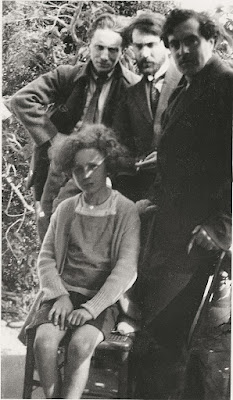CONCERTO PER MICHAELANGELO
Concerto per Michaelangelo (1977), Beaubourg, centred'art et de culture Georges Pompidou (1977) ... aka Beaubourg (International: English title) dir Roberto Rossellini, Cinematography by Néstor Almendros.
These two TV documentaries comprise Roberto Rossellini´s last works. In these two documentaries Rossellini seems to briefly summarise the chief concerns of his life in film. In them he returns to painting, possibly his point of departure. The relationship between painting and photography is rather like the relationship of a father who sires an enfant terrible who eventually becomes absorbed into the entire status quo after an unbelievable struggle to maintain his independence. Obviously photography cuts out much of the very mundane painting and drawing that comprised much graphic design work of the past. Far from being antagonistic to painting, photography was immediately grasped, by the Impressionists, for instance, as a great aid in their work. In these films it is almost as if Rossellini is returning to those themes he has sought to adumbrate through his long career. The camera captures the roof of the Sistine Chapel or the works in the Pompidou Centre, Paris in long takes, allowing the eye to dwell upon each and every detail. It is as if Rossellini is looking at these works for the very last time, taking stock of each and every one of them, telling us of his wonderment, closing his life with this enduring testament. The works are slow, unmelodramatic, exact, they are unforgettably austere, but essentially controlled, even polite. Rossellini leaves with his final polite farewell, as if to say, there is nothing left to do but to record this exact moment. The entirety of his wonderment is encapsulated in the long take that captures the Creation of Adam in Concerto per Michaelangelo.
Unbelievably it remains a moment of tension.
Paul Murphy, Berlin
These two TV documentaries comprise Roberto Rossellini´s last works. In these two documentaries Rossellini seems to briefly summarise the chief concerns of his life in film. In them he returns to painting, possibly his point of departure. The relationship between painting and photography is rather like the relationship of a father who sires an enfant terrible who eventually becomes absorbed into the entire status quo after an unbelievable struggle to maintain his independence. Obviously photography cuts out much of the very mundane painting and drawing that comprised much graphic design work of the past. Far from being antagonistic to painting, photography was immediately grasped, by the Impressionists, for instance, as a great aid in their work. In these films it is almost as if Rossellini is returning to those themes he has sought to adumbrate through his long career. The camera captures the roof of the Sistine Chapel or the works in the Pompidou Centre, Paris in long takes, allowing the eye to dwell upon each and every detail. It is as if Rossellini is looking at these works for the very last time, taking stock of each and every one of them, telling us of his wonderment, closing his life with this enduring testament. The works are slow, unmelodramatic, exact, they are unforgettably austere, but essentially controlled, even polite. Rossellini leaves with his final polite farewell, as if to say, there is nothing left to do but to record this exact moment. The entirety of his wonderment is encapsulated in the long take that captures the Creation of Adam in Concerto per Michaelangelo.
Unbelievably it remains a moment of tension.
Paul Murphy, Berlin

Comments